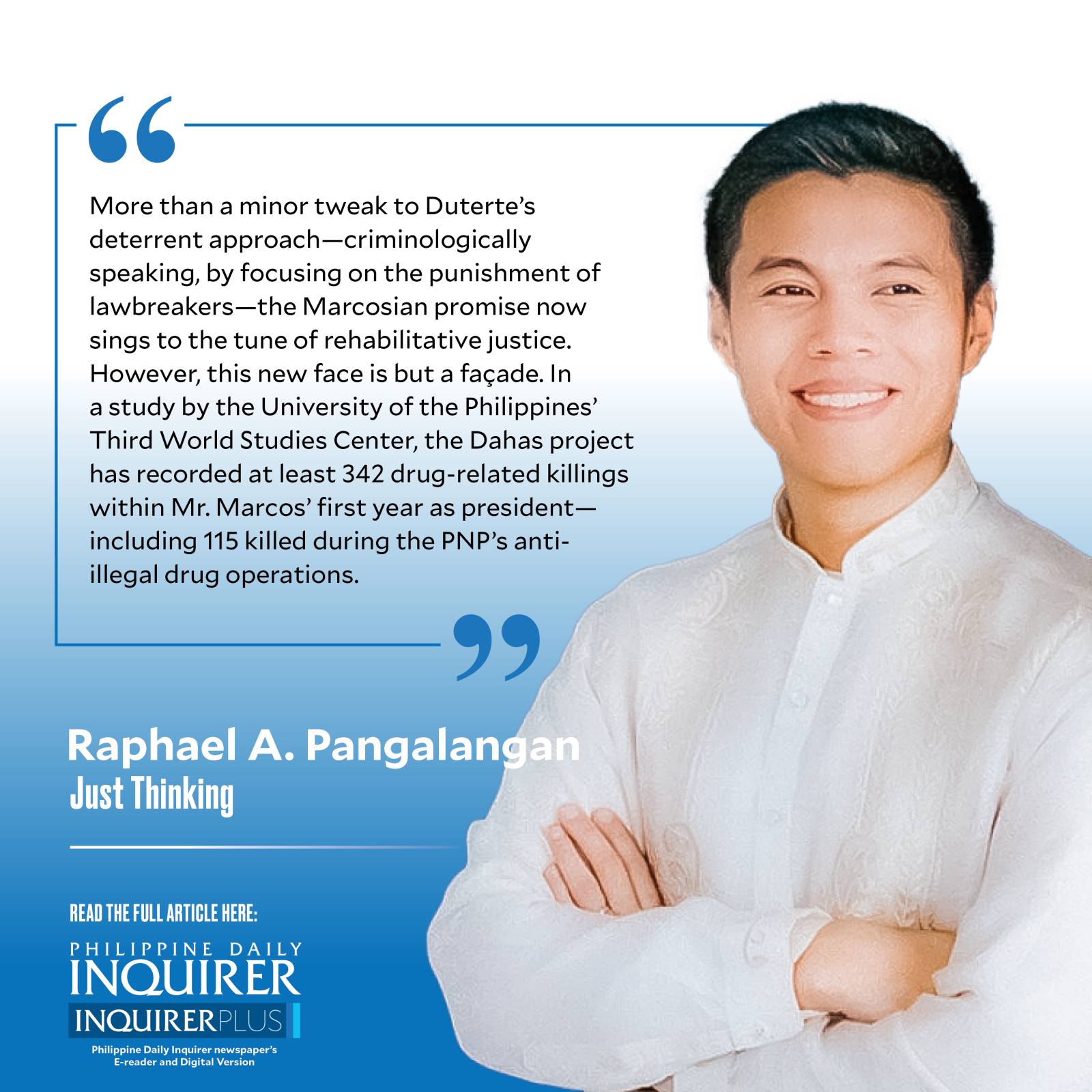Marcos Jr. drug war: New face just a façade

On the fourth Monday of July, there was an elephant in the room.
Amidst the glitz and pomp of the State of the Nation Address (Sona), a glaring omission loomed large. A weighty matter of international importance seemed deliberately brushed aside, tucked away in the recesses of President Marcos’ speech. It was a telling silence. A strategic avoidance that could not go unnoticed.
Justice advocates awaited with bated breath. What did the President have to say on the recent decision of the International Criminal Court (ICC)? Recall: Just last week, the ICC dismissed the Marcos administration’s appeal and authorized the resumption of the Office of the Prosecutor’s investigation in the Situation in the Philippines.
Much like in the year prior, Mr. Marcos concluded his Sona assuring the Filipino people that the “state of the nation is sound.” Yet much like the years past, to the human rights advocates, all that was heard was the sound of silence.
Mr. Marcos had only choice words on the drug war. With well-crafted words, he spun a narrative of transformation, presenting a seemingly gentler approach to the notorious campaign he inherited. He declared that “the campaign against illegal drugs continues—but it has taken on a new face.” Deviating from the visceral and vicious slant of the previous administration, he claims that the drug war “is now geared toward community-based treatment, rehabilitation, education, and reintegration, to curb drug dependence among our affected citizenry.” He continues: “We will relentlessly continue our fight against drug syndicates, shutting down their illegal activities, and dismantling their network of operations.”
While dubious in practice, the policies Mr. Marcos speaks of—in principle—gives former president Rodrigo Duterte’s war on drugs a much needed facelift. Indeed, seven years into Command Memorandum Circular (CMC) No. 16-2016, the term “drug war” has grown synonymous with “Oplan Tokhang.” But recall, CMC 16-2016 isn’t called “Project Double Barrel” for nothing. The Philippine National Police acted through two prongs: (i) the “Oplan HVT” (“Upper Barrel Approach”) directed at high-value targets, and (ii) the “Oplan Tokhang” (“Lower Barrel Approach”) aimed at street-level personalities. “Tokhang” is a portmanteau of words “toktok” (knock) and “hangyo” (plead); referring to the house visits conducted by the PNP to “urge” the surrender of “drug personalities”—the term of art for street drug peddlers and users.
Though “Project Double Barrel” contemplates a two-tiered approach, history shows that the PNP has targeted mostly underprivileged communities through the “Oplan Tokhang.” By the end of Duterte’s term, the body count stood at an estimated 30,000, most of them small-time drug peddlers and slum-dwelling users, and a fifth of them openly killed in police operations. It is for this reason that the “Oplan Tokhang” has become synonymous with the extrajudicial killings in the war on drugs.
Now, Mr. Marcos speaks of shifting the focus from the drug user to the drug syndicate. In this way, he attempts to distance himself from the shadows of the Dutertian past. More than a minor tweak to Duterte’s deterrent approach—criminologically speaking, by focusing on the punishment of lawbreakers—the Marcosian promise now sings to the tune of rehabilitative justice. However, this new face is but a façade. In a study by the University of the Philippines’ Third World Studies Center, the Dahas project has recorded at least 342 drug-related killings within Mr. Marcos’ first year as president—including 115 killed during the PNP’s anti-illegal drug operations. He presents to us a thin veil, barely hiding the truth. Indeed, chilling realities that lie beneath the surface. The “Oplan Tokhang”’s legacy is one of extrajudicial killings and a climate of fear that continues to haunt the nation.
While the Marcos administration has announced that it would no longer engage with the ICC, clearly it is still playing ball with the court of law. It is playing both sides, signaling to the one camp that it will not recognize the international tribunal’s jurisdiction and exercise thereof, yet in that same breath gesticulate its departure from Duterte and its compliance with international standards. Indeed, somewhere in his Sona, Mr. Marcos even managed to plug in something of a faint semblance of accountability by indicating that “unscrupulous law enforcers and others involved in the highly nefarious drug trade have been exposed” and will resign. Though on closer scrutiny, he himself reveals this administrative measure is imposed not for drug war-related crimes, but for “corruption or incompetence in government.”
Mr. Marcos should be wary: If he does not tread carefully, the drug war will no longer be only Duterte’s but his own. And though the Philippines has withdrawn from the Rome Statute, history shows, as I am sure, Mr. Marcos and his advisors are aware, that there is no situation beyond international accountability. Whether it be through the United Nations Security Council-made tribunals like in the former Yugoslavia and Rwanada, or through Article 12(3) of the Rome Statute which may give the ICC jurisdiction over crimes committed even after the Philippines’ withdrawal—all these serve as a staunch reminder to the President that it remains well within his interest to distance himself from Duterte and the Dutertian drug war.
—————-
thinkjustly@gmail.com




















